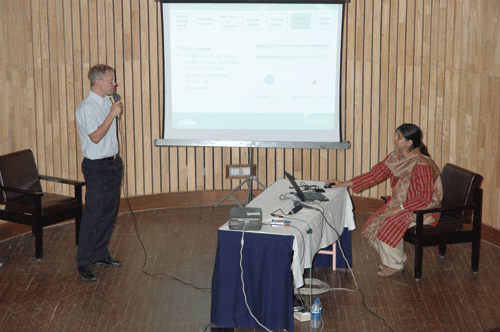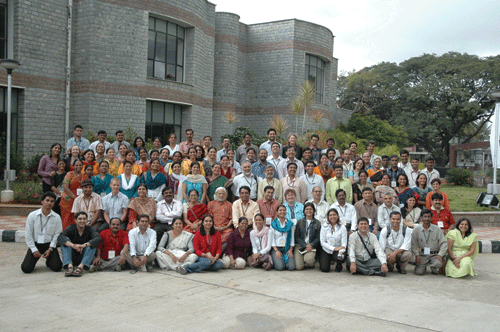One of the biggest challenges facing the Indian education system today is ensuring that the 5.5 million teachers in 1.2 million elementary schools have the support they need to improve the quality of classroom instruction. Technologybased tools which integrate interactive multimedia into the instructional process have the potential to do so. The use of these tools, such as computer software, video and radio programs to promote student learning, while limited, is growing. Many state governments, for example, are beginning to make large investments in technology hardware for schools. However, there is an overall lack of policy on the use of educational technology tools, and the quality of these tools varies widely. With this realization, The QUEST Alliance, hosted a three day National Instructional Design Workshop in Bangalore, India from November 2-4, 2006.
As QUEST’s first official event, the workshop successfully brought together 120 leading education experts, content creators and state government officials to share lessons and explore ideas on how to enhance the quality of content development for educational technology tools in Indian government schools. The workshop was a collaborative effort of QUEST partners Azim Premji Foundation (APF), the International Youth Foundation and Education Development Center (EDC) India.

Douglas Bell from EDC and Punam Medh from Idesignskills leading the important session on design & development at the ID workshop.
The aim of the Instructional Design workshop was two-fold: 1) to present a systematic methodology for the design and development of quality econtent, and 2) to develop a set of policy recommendations to help guide practitioners and policy makers in developing and investing in technology-based education tools.
The importance of developing educational technologies that encourage student-centered learning and help teachers facilitate interactive instruction was discussed in depth. Speakers deliberated openly with participants about the many challenges quality teaching is related to, including the prominence of multi-grade teaching, the low ratio of computers to students, and the need for teacher training in areas such as computer instruction. QUEST partners APF and EDC have responded to this reality by designing interactive software that allows multiple students to work together on single computers, with instruction facilitated by the teachers.
In the words of Punam Medh, instructional design expert and workshop speaker, “The need for instructional design training for pre-service and in-service teachers who are beginning to deal with technology in the classroom is acute for two reasons: First, teachers trained in instructional design methods will be empowered to make systematic daily lesson plans that include the use of technology resources. Second, moving ahead, instructional design can provide a framework for teachers to make informed decisions about the subject matter, resources and media that are required.”

Noted e-content thought leader Badrul Khan with Tiffany Kozalka, Professor of Instructional Design in Syracuse University, USA at the ID workshop organised by QUEST Alliance
Some of the most active and engaging sessions at the workshop were those on Needs Assessment, Design & Development and Evaluation, reflecting a strong need for technical training in proven instructional design methodologies.
Another recurring theme of the workshop and a critical ingredient to the successful implementation of educational technology is the need to engage relevant stakeholders in the instructional design decision-making process. Incorporating good instructional design methodologies into the development of technology tools cannot be done in isolation – input from all major stakeholders at the policy and practitioner level needs to be considered. During several policy sessions, government officials worked with participants to identify key stakeholders, including the government, NGOS, researchers, content creators, administrators and teachers.

Workshop Group
The QUEST Alliance views the 3-day workshop as a first step in stimulating a dialogue around instructional design for educational technology as a serious discipline in India. More work is needed, including further research and development in the field, the need for communication and sharing of lessons, and capacity building in the area of teacher training. As a follow up to the workshop, QUEST is drafting a policy framework, which can inform decision-makers at all levels of the education system, particularly state government officials. This framework is intended to serve as a guide for the development and implementation of educational technologies and is expected to be completed this December. To learn more about the Instructional Design workshop and to view workshop materials, go to www.eeaonline.org/questresources.asp.





















